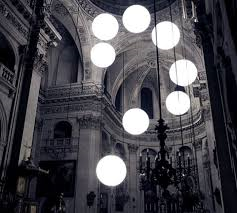Pray Tell offers three views – from Rita Ferrone, Anthony Ruff OSB, and Paul Inwood.
* * * * *
Rita Ferrone writes:
 Given everything that Pope Francis has said and done so far, I find it impossible to believe that he has appointed Cardinal Sarah as prefect to the Congregation for Divine Worship in order to foster a traditionalist liturgical revival.
Given everything that Pope Francis has said and done so far, I find it impossible to believe that he has appointed Cardinal Sarah as prefect to the Congregation for Divine Worship in order to foster a traditionalist liturgical revival.
Pope Francis is a man of broad sympathies. He is steeped in the reformed liturgy, but has no particular liturgical ax to grind. He is not a liturgist. Everything he has done so far suggests that he is interested in pastors and regaining a sense of mission in the Church, and not at all in taking sides in liturgical disputes which can absorb much energy without obvious gains for the body corporate.
Cardinal Sarah is clearly an unexpected and unusual choice to lead the CDW. He does not come to his new position as an authority on liturgy or even particularly as a student of the liturgy, much less an advocate for a “reform of the reform.” What he does have in his resume however is 22 years pastoring a diocese in Africa, the most rapidly growing area of the Catholic world.
 His appointment “works” internally (in the Curia) by removing him from Cor Unum, which is about to be absorbed into a larger agency in the coming reorganization, and giving him a new job. At the same time, it suggests there will be no crusading for liturgical agendas—of any ideological stripe—flowing from this Congregation in the months to come.
His appointment “works” internally (in the Curia) by removing him from Cor Unum, which is about to be absorbed into a larger agency in the coming reorganization, and giving him a new job. At the same time, it suggests there will be no crusading for liturgical agendas—of any ideological stripe—flowing from this Congregation in the months to come.
A lot of questions remain concerning how Cardinal Sarah will acquit himself in this position, which remains important. We shall see. Priests (and bishops for that matter) who don’t have a deep knowledge of liturgy obtained through disciplined study nevertheless “know what they like.” Let us hope that what Cardinal Sarah “likes” — and what he does as prefect of the CDW — keep pace with the style and tone set by Pope Francis.
* * * * *
Anthony Ruff OSB writes:
Odd choice, Cardinal Sarah. (No, Francis didn’t create the first female cardinal, as someone reportedly thought upon seeing the headlines.)
Is this appointment a casualty of curia reshuffling, with a cardinal ‘left over’ who had to be put somewhere? Perhaps. But Francis is a shrewd politician who send signals with his bold gestures and does things for a reason.
Is this a sign that the honeymoon is over for liberals, and the beginning of their dawning realization that Francis isn’t on their side? I don’t think so. Francis is on everyone’s side, and his great charism is unifying the church. That means moving beyond the liturgy wars with the attendant winners and losers in every Vatican decision.
Is this a bone thrown to the traditionalists? Perhaps. It would be like Francis to sense who is hurting and reach out to them. If so, the liturgical progressives should respect Francis’s judgment, trust his political instincts, and imitate his generous spirit.
Is this another sign that Francis doesn’t give a hoot about liturgy? (Insert your favorite Jesuit liturgy joke here…) I think not. He likes his liturgy short and simple, with more rather than less vernacular, and papal liturgies will surely continue in that vein. But he is very reverent and serious when he celebrates. He is a man of prayer.
Is the appointment of someone from Cor Unum a sign that Francis thinks liturgy isn’t about externals or an end in itself, but a means to love and serve God’s people? I’d like to think so.
 Is this part of a coming downsizing of CDW’s responsibilities, with less centralization? Probably. Time will tell. (By the way, Cardinal Sarah is fluent in English, French, and Italian.)
Is this part of a coming downsizing of CDW’s responsibilities, with less centralization? Probably. Time will tell. (By the way, Cardinal Sarah is fluent in English, French, and Italian.)
Is this part of ongoing internationalization of the curia? Probably. One of the ways Francis is moving us beyond the liturgy wars we English speakers do so well is by making us all more aware of Catholicism elsewhere, e.g. in Africa and Latin America. (By the way, with the recent death of Cardinal Angelini, I’m told that there is no Roman in the College of Cardinals – surely a first in church history.)
Is this appointment a mistake? Could be. Popes too make mistakes. Let’s hope, rather, that it is just what the church needs now.
* * * * *
Paul Inwood writes:
 At first sight, it might look as if Cardinal Robert Sarah could be another Francis Arinze, another West African prelate in a traditional, even fundamentalist, mold. Like Arinze, Sarah is quite outspoken on moral issues, and he does apparently show a preference for the Extraordinary Form and the cappa magna, but there the resemblance appears to end. Arinze spent a lot of time hectoring people about perceived abuses which mostly were not even happening in the territories he was visiting (but he certainly gave people some ideas!). Sarah apparently is different. Informed opinion sums him up like this: Another prefect who knows little about liturgy but who probably won’t throw his weight around too much either.
At first sight, it might look as if Cardinal Robert Sarah could be another Francis Arinze, another West African prelate in a traditional, even fundamentalist, mold. Like Arinze, Sarah is quite outspoken on moral issues, and he does apparently show a preference for the Extraordinary Form and the cappa magna, but there the resemblance appears to end. Arinze spent a lot of time hectoring people about perceived abuses which mostly were not even happening in the territories he was visiting (but he certainly gave people some ideas!). Sarah apparently is different. Informed opinion sums him up like this: Another prefect who knows little about liturgy but who probably won’t throw his weight around too much either.
This might be borne out by Sarah’s motto: Sufficit tibi gratia mea, “My grace is enough for you” (2 Corinthians 12:9). Dependency on God is the underlying theme, perhaps even with the notion of letting God act, rather than acting yourself. The second half of the verse is “my power is perfect in weakness”.
 If Sarah is indeed not knowledgeable, even disinterested, when it comes to matters liturgical, and if he does indeed adopt a hands-off approach in his new position, then this will make Archbishop Arthur Roche’s role as secretary all the more important. We will be looking to him for sane wisdom and action as we transition from what has been a turbulent few years. The recent departure of some established personnel from the Congregation may give cause for fresh hope that Archbishop Arthur will now be able to accomplish what has not so far been possible: a return to liturgical development in the spirit of Vatican II rather than perpetuating attempts to undermine and even undo what the Council Fathers asked for.
If Sarah is indeed not knowledgeable, even disinterested, when it comes to matters liturgical, and if he does indeed adopt a hands-off approach in his new position, then this will make Archbishop Arthur Roche’s role as secretary all the more important. We will be looking to him for sane wisdom and action as we transition from what has been a turbulent few years. The recent departure of some established personnel from the Congregation may give cause for fresh hope that Archbishop Arthur will now be able to accomplish what has not so far been possible: a return to liturgical development in the spirit of Vatican II rather than perpetuating attempts to undermine and even undo what the Council Fathers asked for.


Leave a Reply